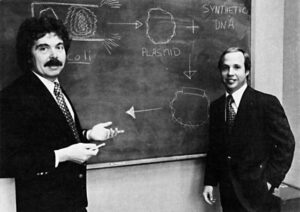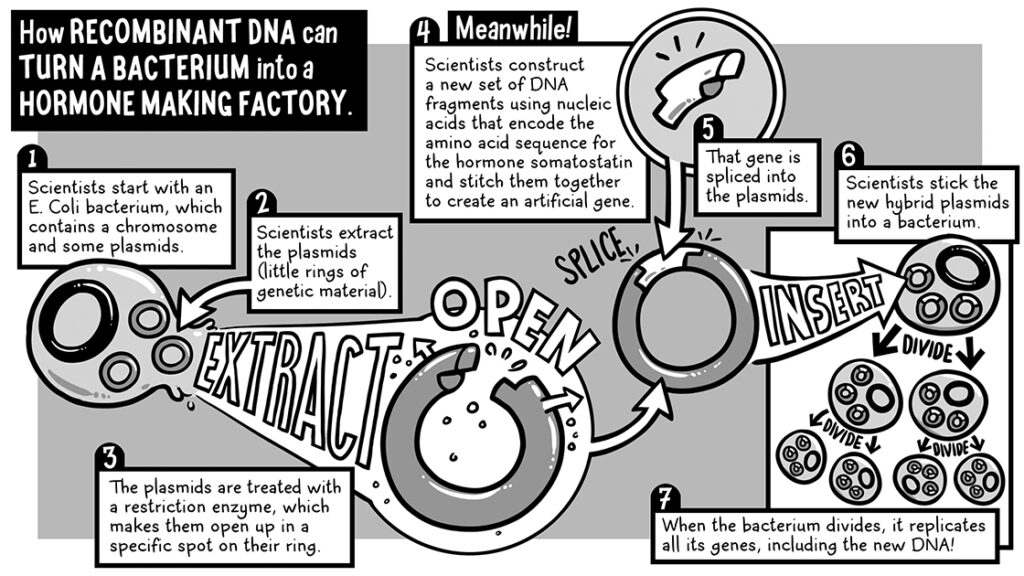By Shannon White
These oral histories provide a comprehensive look into a revolutionary period of scientific development and the birth of a booming industry.
The Bioscience and Biotechnology oral histories are part of a collection of interviews from the Oral History Center documenting the development of the biotechnology industry in California. The Center’s digital collections contain twenty-nine oral histories related to different aspects of bioscience in this project alone, including interviews from founders and notable members of some of the most influential biotechnology companies of the twentieth century.
The Who
Many of the interviews in the project center around the company Genentech, a research-oriented biotechnology startup founded in 1976 by the venture capitalist Robert Swanson and by Herbert Boyer, a biochemist from the University of California, San Francisco. Oral histories from both Swanson and Boyer are present in the catalog, along with testimonies from several other Genentech employees involved in both the research and the legal sides of the company. Notable interviewees include Thomas Perkins, founder of the venture capital firm Kleiner Perkins and an early investor in Genentech; Thomas Kiley, the company’s first general counsel; Axel Ullrich, the former director of the Molecular Biology Department at the Max Planck Institute of Biochemistry and an early hire at Genentech; and David Goeddel, one of Genentech’s first scientists and the later co-founder of the pharmaceutical company Tularik. Here, Thomas Kiley speaks about his integration into the company and his involvement with the early days of patent law surrounding the human genome:
I had participated in the negotiation of the company’s arrangements with major pharmaceutical companies having to do with growth hormone and with insulin and with interferon; and written the company’s patent applications to that point, its brief in the Supreme Court and the inferior court on the question whether life could be patented; had been involved in the evolution and ultimate settlement of threatened litigation on the part of University of California. So by the time I walked through Genentech’s doors as a full-time employee it’s fair to say I was hip deep in the company’s issues and culture.

Though many of the oral histories in this collection are focused on Genentech, there are a few other notable institutions covered in the scope of the project. There are several interviews from people involved in other pharmaceutical companies like Chiron Corporation, a biotech firm founded in Emeryville in the 1980s with a focus on vaccines and blood testing, or Cetus Corporation, a company founded in Berkeley in the 1970s. The pharmaceutical giant Eli Lilly and Company also comes into play in these oral histories—beyond the individual interviews from people who worked for the corporation, many interviewees from Genentech and other organizations recall dealings between Eli Lilly and other companies for research and development purposes. Interviews by Keiichi Itakura and Arthur Riggs chronicle the City of Hope Medical Center’s contributions to Genentech’s early DNA synthesis and recombinant DNA research.
The University of California also plays a recurring role in the Bioscience and Biotechnology interviews. Many of the narrators were associated with the university during their undergraduate years or later as researchers and faculty members. For example, William Rutter, the co-founder of Chiron Corporation, served as the chair of the Department of Biochemistry and Biophysics at the University of California, San Francisco from 1968 to 1982 before transferring to direct the university’s Hormone Research Institute until 1989. Herbert Boyer was a faculty member at UCSF from 1966 until 1991. Several other interviewees, including Michael Urdea, Herbert Heyneker, and Axel Ullrich, were postdoctoral fellows at UCSF before transferring to work in the corporate pharmaceutical industry.
The What
Within the Bioscience and Biotechnology interviews, there are several common topics of discussion. Many of these narrators were at the forefront of cutting-edge DNA research in the 1970s and 1980s and have since achieved worldwide recognition for their contributions to the fields of molecular biology and biochemistry. In their individual interviews, you can find discussions on their projects, laboratory environment, and the issues of balancing breakthrough research with establishing a fledgling company. For example, Daniel Yansura’s oral history details his involvement with developing the vaccines for hepatitis B and foot-and-mouth disease. In his interview, Herbert Heyneker goes over Genentech’s somatostatin project. Multiple narrators discuss Genentech’s efforts to synthesize human insulin and human growth hormone. David Goeddel’s interview brings up the growing awareness of the importance of recombinant DNA research that surrounded the biotech industry’s rise:
There wasn’t one point when, ahhh, it all clicked in. And then it was students’ talk, and then you see the paper. I think it never hit me instantly like, “Oh, this is going to revolutionize science.” It was more of a gradual thing over a few months, where I went from not understanding much at all the first time [Marvin Caruthers] had told me, to all of a sudden, “Oh yes, I know this [recombinant technology] is going to be very important.”

The growth of this burgeoning industry was, however, mired by controversy. Throughout the 1970s, regulation and commercialization of recombinant DNA technology was a hot topic in the scientific community. Following the publication of the National Institutes of Health (NIH) Guidelines for Recombinant DNA Research, limitations were imposed on DNA research and several prominent scientists were called to testify concerning legislation for work with recombinant DNA. Axel Ullrich and Keith Yamamoto, a UCSF faculty member and the current vice chancellor for Science Policy and Strategy at the university, discuss some of these issues in their oral histories. Yamamoto’s history in particular details the turmoil at UCSF surrounding the potential illegal usage of the pBR322 plasmid in experiments prior to UCSF faculty members William Rutter and Herbert Boyer being summoned before a Senate subcommittee in 1977. Here, Yamamoto recalls the environment that gave birth to the NIH Guidelines for Recombinant DNA Research:
This was completely untested. So it wasn’t that [any one] of us had any direct evidence that there would be a problem, but it was easy to conjure one up. And everything else out there was unknown.
This is not the only controversy covered in the project, however. In 1990, the University of California filed a lawsuit against Genentech for patent infringement, alleging that former employee Peter Seeburg, with the help of Axel Ullrich, had stolen samples of the human growth hormone gene discovered at the university labs and used them at Genentech. David Goeddel testified against Seeburg, claiming that researchers at Genentech had isolated and sequenced their own version of the gene. Both Goeddel and Ullrich comment on the suit in their interviews. In this quote, Ullrich discusses the events of the “midnight raid”:
On the last day of ’78, I had packed up all my things, including a box with reagents and clones and so on. Peter Seeburg, who had been banned from the lab, knew that I was leaving that evening, New Year’s Eve ’78. So he had asked me if he could come with me at night and get his own clones too.
This oral history project also contains interviews regarding the financial, legal, and administrative aspects of running a pharmaceutical company. For example, Thomas Perkins and Fred Middleton, the first CFO at Genentech, offer their perspectives on investment and financial strategies in the biotech industry. Dennis Kleid, a scientist-turned-patent agent at Genentech, and Thomas Kiley discuss the legal aspects of the company and their experiences offering patent counsel. The collection also boasts interviews with several leaders at various companies, including Richard Scheller, the former director of scientific research for Genentech; William Rutter, the co-founder of Chiron Corporation; and William Young, the former COO of Genentech and CEO of ViroLogic (now Monogram Biosciences). Here, Dennis Kleid reflects on the competitiveness of the biotechnology industry:
But what I’ve noticed from working in the legal area is that the innovator or leader gets a knife in the back from the copycat, the guy behind you. It takes a lot more money and expertise and time to do something first.
The Why
So, what makes these oral histories a unique contribution to the Oral History Center’s collection?
To start, they provide a comprehensive look into a revolutionary period of scientific development and the birth of a booming industry. Contained within these interviews are the firsthand accounts of several scientists, innovators, and academics who have gained worldwide renown for their work. The story of Genentech and its contemporaries is long and complex, spanning several decades and chronicling the growth of a wildly successful scientific endeavor. Here Thomas Perkins discusses his faith in the early biotech effort:
In the very early days of Genentech, I was very skeptical. . . You just have to hand it to Swanson. He saw it more clearly than anyone. He saw it more clearly than Boyer did. He saw it more clearly than anyone in the world.
The oral histories in this project may be of use to scholars concerned with the history of the biotechnology and pharmaceutical industries, people interested in innovation and startup culture, science or law students exploring future career options, and countless other individuals.

Find these interviews and all Oral History Center interviews from the search feature on our home page. You can search by name, keyword, and several other criteria. You can also find projects, including the Bioscience and Biotechnology oral histories, through the menu on our home page from Oral Histories > Projects.
Shannon White is currently a third-year student at UC Berkeley studying classical languages. They are an undergraduate research apprentice in the Nemea Center under Professor Kim Shelton and a member of the editing staff for the Berkeley Undergraduate Journal of Classics. Shannon works as a student editor for the Oral History Center.
Related resources through The Bancroft Library
Genentech records, approximately 1980-2000, BANC MSS 2005/190 c.
Genentech: The beginnings of biotech, by Sallie Smith Hughes, Bancroft HD9999.B444 H85 2011
